|
|
|
Sort Order |
|
|
|
Items / Page
|
|
|
|
|
|
|
| Srl | Item |
| 1 |
ID:
145617
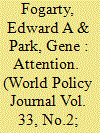

|
|
|
|
|
| Summary/Abstract |
Political scientists Edward A. Fogarty and Gene Park argue that the world’s response to the 2008 economic crisis demonstrates that, when the next global economic disaster hits, members of the G-20 will work together. Outside of crisis, the G-20 can only be expected to take baby steps toward greater coordination and fiscal transparency.
|
|
|
|
|
|
|
|
|
|
|
|
|
|
|
|
| 2 |
ID:
101212


|
|
|
|
|
| Publication |
2010.
|
| Summary/Abstract |
While Brazil has increased its interdependence within the global system, the "geometry" of this interdependence has changed; that is, it has become less vertical (in relation to the United States), more "diagonal" (in relation to Europe) and more horizontal (in relation to other developing countries). Moreover, this article argues that the vulnerability dimension of Brazilian interdependence has been assuaged and concludes with some putative consequences of this fading interdependence and a policy prescription on what the United States could do if it wants to reverse this trend.
|
|
|
|
|
|
|
|
|
|
|
|
|
|
|
|
| 3 |
ID:
170685
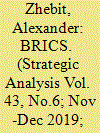

|
|
|
|
|
| Summary/Abstract |
Having overcome its ‘middle-power’ complex during the centre-left governments, Brazil obtained a relatively robust position in international politics as global power, siding with G-20, BRICS and other multilateral bodies. However, since the 2018 presidential elections Brazil has been undergoing a visible shift in its foreign policy towards more alignment with the US and the West that questions its traditional international autonomy, multilateralism, South-South engagement and environmental activism. This shift may consequently affect not only its positioning within the BRICS and governance alike, but also cause a slide into a conservative complacency with a hegemonic vision of the multipolar world.
|
|
|
|
|
|
|
|
|
|
|
|
|
|
|
|
| 4 |
ID:
102254
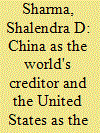

|
|
|
|
|
| Publication |
2010.
|
| Summary/Abstract |
China is now the world's leading creditor nation, while the United States is the world's largest debtor. Beijing is the largest foreign holder of US government debt - passing Japan in 2008 to become, in effect, the US government's largest foreign creditor. While some claim this gives Beijing unprecedented power over the United States, others claim that China's power is in fact greatly circumscribed. This paper shows that although current patterns of economic interdependence between the two economies invariably pushes each towards cooperation, China is deeply concerned about the future trajectory of the US economy and is already engaged in loosening the bonds of interdependence. This has profound implications for Sino-US relations and the global economy.
|
|
|
|
|
|
|
|
|
|
|
|
|
|
|
|
| 5 |
ID:
088079
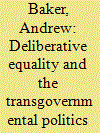

|
|
|
|
|
| Publication |
2009.
|
| Summary/Abstract |
Revisiting the concept of transgovernmentalism, originally developed by Robert Keohane and Joseph Nye, can shed considerable light on the nature of interstate cooperation in contemporary global financial governance. Transgovernmentalism highlights how certain technocratic policy communities, composed of finance ministries, central banks, and regulators, dominate the global financial architecture. It also provides insights into the political and social basis of these actors' interactions and deliberations. Most importantly, renovating the concept of transgovernmentalism brings the participatory deficits in the current global financial architecture into sharp focus and points us in the direction of a workable reform agenda that would expand inclusion and participation. This article advocates basing future reform on efforts to achieve a closer realization of the principle of "deliberative equality." Unfortunately, "transgovernmentalism" is incompatible with deliberative equality, meaning that it is precisely the transgovernmental characteristics of the current global financial architecture that have to be challenged and overturned if we are to arrive at anything approximating deliberative equality.
|
|
|
|
|
|
|
|
|
|
|
|
|
|
|
|
| 6 |
ID:
125440
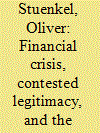

|
|
|
|
|
| Publication |
2013.
|
| Summary/Abstract |
The rise of the BRIC grouping (Brazil, Russia, India, China) is one of the most commented on phenomena in international politics of the past year. Yet little is known about how and why institutionalized cooperation between the BRIC countries began. This article makes two arguments. First, an unprecedented combination in 2008- a profound financial crisis among developed countries, paired with relative economic stability among emerging powers- caused a legitimacy crisis of the international financial order, which led to equally unprecedented cooperation between emerging powers in the context of the BRIC grouping. The BRIC countries were able to use their temporarily increased bargaining power to become agenda setters at the time -culminating in the international Monetary Fund quota reform agreed on in 2010. This shows that even short periods of reduced legitimacy in global governance can quickly lead to the rice of alternative institution - such as, in the case of the crisis that began in 2008, the BRIC platform- which now forms part of the landscape of global governance . Second, intra-BRIC cooperation in the area of international finance enhanced trust among the BRIC countries and led to a broader type of cooperation in many other areas, suggesting the occurrence of spillover effects. Intra-BRICS cooperation (Brazil, Russia, India, China, South Africa) is therefore likely to continue, even after the condition that facilitated its genesis- the crisis in the West- have disappeared.
|
|
|
|
|
|
|
|
|
|
|
|
|
|
|
|
| 7 |
ID:
100332
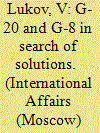

|
|
|
|
|
| Publication |
2010.
|
| Summary/Abstract |
FOLLOWING THE CHRONOLOGY of events, the story of the two summits that took place in Canada in late June should be started with the meeting of the G-8 leaders in Muskoka (June 25-26). However, the logic of global economic development and the changing balance of the two global forums suggest that the first to be analyzed should be the results of the G-20 summit in Toronto (June 26-27).
The summit was conceived as an intermediate one between the Pittsburgh and Seoul summits. The Canada meeting was expected to discuss mainly the implementation of the Framework for Strong, Sustainable, and Balanced Growth. However, due to a number of new financial-economic and political circumstances, its significance increased greatly and so the agenda had to be revised. There were several reasons for that.
Firstly, the sovereign debt crisis in Greece. It showed dramatically what consequences the uncontrolled growth of budget deficits and state debts in the majority of developed Western countries could have for the global economy as a whole. These debts have been accumulated over a long time but their explosive growth occurred during a crisis period, on the one hand, because of government spending on anti-crisis programs and on the other, because of shrinking budget revenues amid an economic slump.
|
|
|
|
|
|
|
|
|
|
|
|
|
|
|
|
| 8 |
ID:
086433
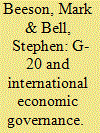

|
|
|
|
|
| Publication |
2009.
|
| Summary/Abstract |
Following the East Asian crisis of 1997-1998, much attention was paid to financial sector reform. While little of substance has changed in the intervening years, a number of potentially important new forums were established to facilitate international cooperation. By drawing on and modifying theories of hegemony, this article provides a theoretical context within which to explore one of these institutions: the Group of 20 (G-20). The key question examined is whether institutions like the G-20 are likely to provide genuine mechanisms for cooperation and inclusion or simply become instruments of "hegemonic incorporation." The argument here is that despite the continuing "structural" dominance of the international system by the United States and the Group of 7 (G7) nations, the G-20 provides some scope for other nations to influence outcomes.
|
|
|
|
|
|
|
|
|
|
|
|
|
|
|
|
| 9 |
ID:
152744


|
|
|
|
|
| Summary/Abstract |
This article analyzes the sources of gridlock in the Group of 20 since the global financial crisis. It engages with this question through Mark Beeson and Stephen Bell's framework, which identifies two processes of socialization operating concurrently within the G-20: hegemonic incorporation and collectivist cooperation. While hegemonic incorporation seeks to socialize the rising Southern powers into the US-led world order, their inclusion over time drives the G-20 toward more collective and cooperative forms of global governance. The article argues that the GFC has altered this equation in two ways: by accelerating the shift of economic power from the North to the South, and by undermining the hegemony of neoliberalism in the South. These two developments have made the United States less willing to offer the concessions necessary for hegemonic incorporation while, at the same time, bolstering the confidence of the Southern powers. Consequently, the article proposes that both hegemonic incorporation and collectivist cooperation are undermined, leading instead to gridlock and fragmentation. The article illustrates this argument through a case study of the gridlock surrounding the issue of global imbalances.
|
|
|
|
|
|
|
|
|
|
|
|
|
|
|
|
| 10 |
ID:
140420
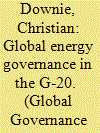

|
|
|
|
|
| Summary/Abstract |
There is an emerging consensus among global governance scholars that there is a global energy governance gap. The rapid transformation of global energy markets with a new cast of producers and consumers, which now accounts for two-thirds of global greenhouse gas emissions, has left the existing institutional architecture behind. While there has been some discussion in the emerging literature on the potential role of the Group of 20, there is almost no analysis of what conditions need to be met for the G-20 to act in a significant fashion. This article takes up this task. Drawing on recent scholarship in global governance, environmental politics, and international negotiations, as well as the observations of the author who is a past delegate to G-20 negotiations, it considers the role of the G-20 in global energy governance and identifies the principal conditions that will need to be met if the G-20 is to drive more than piecemeal change.
|
|
|
|
|
|
|
|
|
|
|
|
|
|
|
|
| 11 |
ID:
095930


|
|
|
|
|
| Publication |
2010.
|
| Summary/Abstract |
The central themes to be addressed during the Doha Round of the world trade negotiations are the reduction of the agricultural production and export subsidies and improved market access for agricultural and non-agricultural goods. The G-20 group wields enough power to press negotiations at the Doha Round toward lower agricultural trade barriers and production and export subsidies. The objective of this study is to determine the impacts of the Doha Round on the economies of Brazil, China, and India. The Global Trade Analysis Project's (GTAP) general equilibrium model and database (version 7) are used. The Doha Round scenarios simulated in this paper consider the WTO agricultural production and export subsidy reduction requirement, and the application of the Harbinson approach, and Swiss formula to reduce import tariffs. Brazil and China present the highest GDP growth rate varying from 0.4 % to 1.4%. India shows a negative GDP growth rate in all scenarios, except in that which replicates the Uruguay Round. The welfare gains are positive, but small, for Brazil, China and India. The GDP loss observed in the economies of the EU25 and the US may make it difficult to reach a trade agreement at the Doha Round.
|
|
|
|
|
|
|
|
|
|
|
|
|
|
|
|
| 12 |
ID:
140022
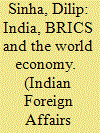

|
|
|
|
|
| Summary/Abstract |
BRICS is not an organised coalition seeking to create its own international order. It lacks adequate homogeneity and shared ideology for that. It is a pressure group of countries which want to be included in the decision-making forums of the international financial system. They feel that they have earned their place, and their credentials must be recognised. The slowdown in the growth rate in all BRICS countries, except India, has prompted many western experts to predict its demise. This appears to be an expression of desire rather than the result of objective analysis. The future shape of BRICS will depend on how the high priests of the present order react to their legitimate demands. What began as a prescient tip of a farsighted investment banker may either result in the reorganization of the existing system or lead to the setting up of a rival structure. The world would be better off in both eventualities
|
|
|
|
|
|
|
|
|
|
|
|
|
|
|
|
| 13 |
ID:
148097


|
|
|
|
|
| Summary/Abstract |
The Indian Prime Minister Narendra Modi had the latest meeting with the Russian president Vladimir Putin at G-20 summit in China in September 2016 even as both the leaders have met several times during the last about two years reconfirming the chemistry of close and cordial bilateral relations and Russia consistently supporting India in various regional and global organizations. For instance, both the leaders met in Tashkent on 26th June 2016 on the sidelines of SCO meeting during which Putin welcomed India signing the Memorandum of Obligations of SCO that has kick-started the process of India’s accession as ‘full member’ into this powerful regional grouping since India will have to sign around 30 other documents to complete the process for membership.
|
|
|
|
|
|
|
|
|
|
|
|
|
|
|
|
| 14 |
ID:
142207
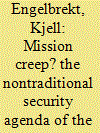

|
|
|
|
|
| Summary/Abstract |
In 2008–2011, the Group of 20 swiftly eclipsed the Group of 7, created in the mid-1970s as an informal mechanism for stabilizing markets and facilitating transnational currency exchange and investment. Several observers have expressed the view that the former, broader group is also destined to appropriate the role of the Group of 8, the G7's pioneering successor in the realm of nontraditional security. This article examines the G7/8 legacy of forging quasi-permanent institutional arrangements and frameworks in this policy area and goes on to gauge nontraditional security initiatives subsequently launched by the G-20. Having juxtaposed the past record of these bodies and analyzed the interests and power dynamics that influence member state action in the short and long term, the article outlines three basic options for how the relationship between the G-20 and the G7/8 may evolve.
|
|
|
|
|
|
|
|
|
|
|
|
|
|
|
|
| 15 |
ID:
085724
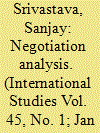

|
|
|
|
|
| Publication |
2008.
|
| Summary/Abstract |
In this article, I address the question of negotiation analysis pertaining to the Cancun Ministerial of the World Trade Organization (WTO). Albeit, the deep differences between developed and developing countries on various trade issues could not be accommodated and the Cancun Ministerial finally collapsed, the coalitional diplomacy and the joint obstinate position taken by the developing countries were unparalleled and deserve concentrated analysis of negotiations and various strategies pursued during the Ministerial. The central contingent variable, in this study is the negotiation strategy pursued by the developing countries at Cancun. In more practical terms the coalitional diplomacy with special reference to the coalition of G-20 and distributive strategy used by the developing countries, have been investigated. Other derivative inquiries delineated here are: how developing countries adhered to and maintained their coalition G-20 at Cancun and the counter strategies of the developed world pertaining to moves made by the developing countries including endgame diplomacy.
|
|
|
|
|
|
|
|
|
|
|
|
|
|
|
|
| 16 |
ID:
107433


|
|
|
|
|
| Publication |
2011.
|
| Summary/Abstract |
OUR UNIPOLAR WORLD IS PASSING INTO HISTORY, AS THE ECONOMIC CENTER OF
gravity shifts eastward and southward and new centers of power emerge. Our
international governance systems and institutions, constructed out of the ruins
of World War II and the Great Depression, have been steadily lagging the steepening curve of change. Meanwhile, as the world struggles with the aftershocks
of the global financial and economic crisis, terrorism, transnational crime and
drug trafficking, climate change, food security and energy prices, the Arab
Awakening, Japan's triple crises, failing and fragile states, the dangers of nuclear proliferation, and so forth, the virtues of multilateral cooperation are being
rediscovered. Many see renewed merit in pooling national sovereignty in cooperative institutional arrangements.1 At the same time, the preeminent power
in the international system, the United States, burdened by debt, hobbled by internal divisions, newly conscious of its limits, led by a president whose formative years are more North-South than East-West, is itself putting greater stock
in partnership and multilateral cooperation.2
In response to this unprecedented
pace and scope of change, old institutions are innovating and new forms and
varieties of international cooperation are being called into being
|
|
|
|
|
|
|
|
|
|
|
|
|
|
|
|
| 17 |
ID:
114222


|
|
|
|
|
| Publication |
2012.
|
| Summary/Abstract |
The Group of 20 summit of developed and developing countries-the self-appointed "premier forum for international economic cooperation"-met in the South Korean capital in November 2010. This was a watershed event in that it was the first time for the G-20 to meet in an Asian, non-G8 country. This article evaluates the success of the Seoul summit against a range of criteria and from various perspectives, in addition to commenting on the appropriateness of these criteria in measuring the performance of future summits.
|
|
|
|
|
|
|
|
|
|
|
|
|
|
|
|
|
|
|
|
|